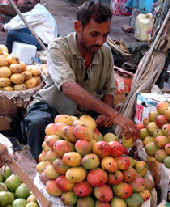|
|
Ishad Ahmed is a fruit-seller seated on a low perch outside the rear entrance to the Park Circus market. On a drizzling late afternoon, he looks gloomier than the ten-odd dusty apples he is selling at Rs 40 per kilogram. Ahmed has been around for the last four years and has not managed a spot inside the market proper. And contemplating a takeover of the market by Reliance makes him alternately smile and study his knives. He says that the small traders in the market will ‘die’ if made to compete with retail giants: “Hamari zindagi barbad ho jayegi.” As we talk, a customer, who had been haggling over the price of bananas for a while, exclaims, “Sar ghum rahe hae daam sunke (The price is making my head spin)!” I ask Ahmed what he would do if a retail giant offered the apples for Rs 35. He says that a cut below Rs 38 would nullify his profit, while anything less than Rs 35 would mean a big loss. Ahmed makes a profit of about Rs 100 a day, Rs 150 on a good day.
I stop by a grocery store inside the market. The owner is bent over a sack of potatoes, picking out the blighted ones. Sweating from the exertion and the lack of a fan, the tersely named Pappu vehemently declares that there is a “no entry” for Reliance as far as the Park Circus market is concerned. Upon my pointing out that if it isn’t Reliance, it might be someone else, he explains that a big company is welcome to rebuild the market. It is such a company’s going into retail trade (as he believes Reliance intends to) that the traders oppose. Less restrained than Ahmed, Pappu alleges that a renovated market would give place to only the bigger shops, and exclude the vegetable vendors.
Without exactly being stoic, Pappu says that the customer has every right to move to a cheaper store, especially if it offers the same or better quality. But a daily profit that varies between Rs 200 and Rs 400 counts him out of any price war with a retail giant.
I pick my way between soiled chicken coops and slimy goat entrails to the small garment shops and chat up Akram Aziz (name changed). As Aziz reiterates the collective fear, Md Ishak (name changed), who owns a stationary store, says that many reaccommodated shop owners would want their present spots, associated with customers’ familiarity. “Besides,” Ishak asks, “what do we do during the long period of reconstruction?”
Next day, curiosity takes me to the roadside market near Ruby General Hospital. After a quick survey of the drowsy afternoon shops and shacks, I settle on a matronly vegetable seller. Kabita Mondal speaks softly. Her family of six lives by her trade. Now that her monthly profit has dropped from Rs 2,000 to nought, she has taken a job as a maid too: “Amader akhon khete pelei holo (Now it’s enough if we just manage to eat).” Today, her customers are mostly immigrant workers with low purchasing power. Many residents of the nearby housing estates have migrated to the Spencer’s outlet down the Bypass. “They come here only when pressed for time,” rues Mondal. Her pockmarked carrots are Rs 20 per kg (Rs 15 at Spencer’s), and supposedly bought at Rs 19. But her healthier tomatoes are Rs 20, while Spencer’s are Rs 22. Pulin Mondal, a fruit vendor, adds that ever since the Spencer’s Super opened, his customers have been reduced to only flying ones. What about his profits? The answer is a curt “None.”
I reflect on the arrogance of small retailers near my house at Jadavpur, a locality yet to be exposed to strong market forces. Pulin says that his fellows will not take any action, and vaguely mentions alternatives he cannot name. In any case, a road-widening project will evict them in the near future.












